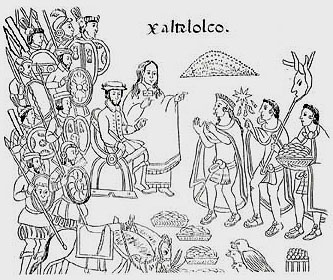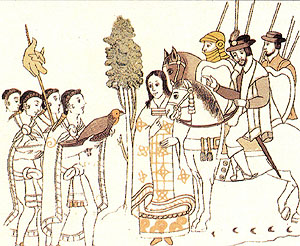|
La Malinche - caught between two worlds
In the 16th century, one woman forever changed the
course of Mexico�s history. She served Hern�n Cort�s
as his translator and mistress and without her
assistance, the Spanish conquistador would likely have
been defeated. She was a woman who had many names,
Malintzin in her youth and Do�a Marina, after she had
been christened. However, today the name she is
frequently remembered by is La Malinche or simply,
Malinche. Her name has become synonymous with hatred
and scorn. Many look upon her as a traitor and hold
her responsible for contributing directly to the
conquest of her people.
Early accounts of her life indicate she was noble-born
to a father who was the ruler of the N�huatl-speaking
village of Paynala. Generally, her date of birth is
attributed to the year 1505 with the year of her
death, 1529. However, there is some evidence that she
may have lived longer. Malinche received an education,
which was rare for a female in her society.
Undoubtedly, it was her father�s status that afforded
Malinche this privilege. Unfortunately, her father
died when she was still a young girl and this tragic
event forever changed her life.
 |
|
Hernan Cortes and La Malinche holding court | |
Before long, Malinche�s mother remarried and gave
birth to a son. Sadly, Malinche was no longer welcome
in the home and was either sold or given away to Maya
slave-traders. Perhaps, the mother was forced to
abandon her child. Some speculate that Malinche
threatened the son�s future inheritance. Regardless,
the chain of events that followed held greater
consequences than anyone could imagine.
In 1519, Cort�s and his men won a battle against a
Mayan settlement in the area of present-day Tabasco.
As a form of tribute, 20 Indian slaves were presented
to the Spaniards. Malinche was amongst them. Her
unique knowledge of N�huatl, the Aztec language, as
well as Mayan dialects, came to the attention of
Cort�s. Another translator was already a part of
Cort�s� entourage, a Spanish priest by the name of
Ger�nimo de Aguilar.
This priest was imprisoned by the Mayans for several
years and had learned their language. This proved an
invaluable asset to Cort�s. However, they soon
encountered Indians who only spoke N�huatl.
The priest initially played a role in these
translations. The representatives of Montezuma would
speak N�huatl with Malinche, who in turn would
translate their words into Mayan for Aguilar. The
priest would then translate the Mayan into Spanish,
for the benefit of Cort�s.
Before long, however, Malinche learned Spanish and
became the direct interpreter for Cort�s. Cort�s
utilized Malinche�s linguistic abilities to his
advantage in his negotiations with the Aztec Empire.
Indeed, Malinche arranged and mediated the
introductions and meetings between Montezuma and
Cort�s. Montezuma carefully considered the Spanish
conquistador the return of Quetzacoatl. However, this
illusion evaporated when he realized Cort�s� true
intent.
 |
|
La Malinche serving as translator for Hernan Cortes | |
Malinche became more than just an interpreter for
Cort�s. Christened with her new name of Dona Marina,
she became the Spaniard�s mistress and in 1522, bore
him a son named Don Mart�n Cort�s. Their child
represents one of the first known Mestizos, an
individual whose blood is a mixture of European and
indigenous American. However, after the affair between
Cort�s and Malinche came to an end, she married
another Spaniard named Juan Jaramillo. Their union
produced a daughter, Maria Jaramillo.
Malinche�s ability to communicate and negotiate with
various tribes allowed the Spanish to march through
territories without being attacked. They picked up
converts along the way. Many indigenous people joined
Cort�s and fought by his side. These tribes were
motivated to join the Spanish, in hope of defeating
their long-standing enemy, the Aztecs. This brutal and
mighty empire had subjugated them for far too long.
Today, in Mexico a derogatory name to call someone is
a �malinchista�, a person who turns their back on
their own culture. Interestingly enough, some do not
consider Malinche a traitor. Some view her as a
heroine, helping spread the word of Christianity. For
others, she was a woman in love, who had no choice but
to follow her heart and protect her beloved Cort�s.
Malinche is viewed as well with honor by those who
consider her one of the first �mothers� of the Mestizo
race. Regardless of how one perceives Malinche, she
forever changed the course of Mexico�s destiny.
|